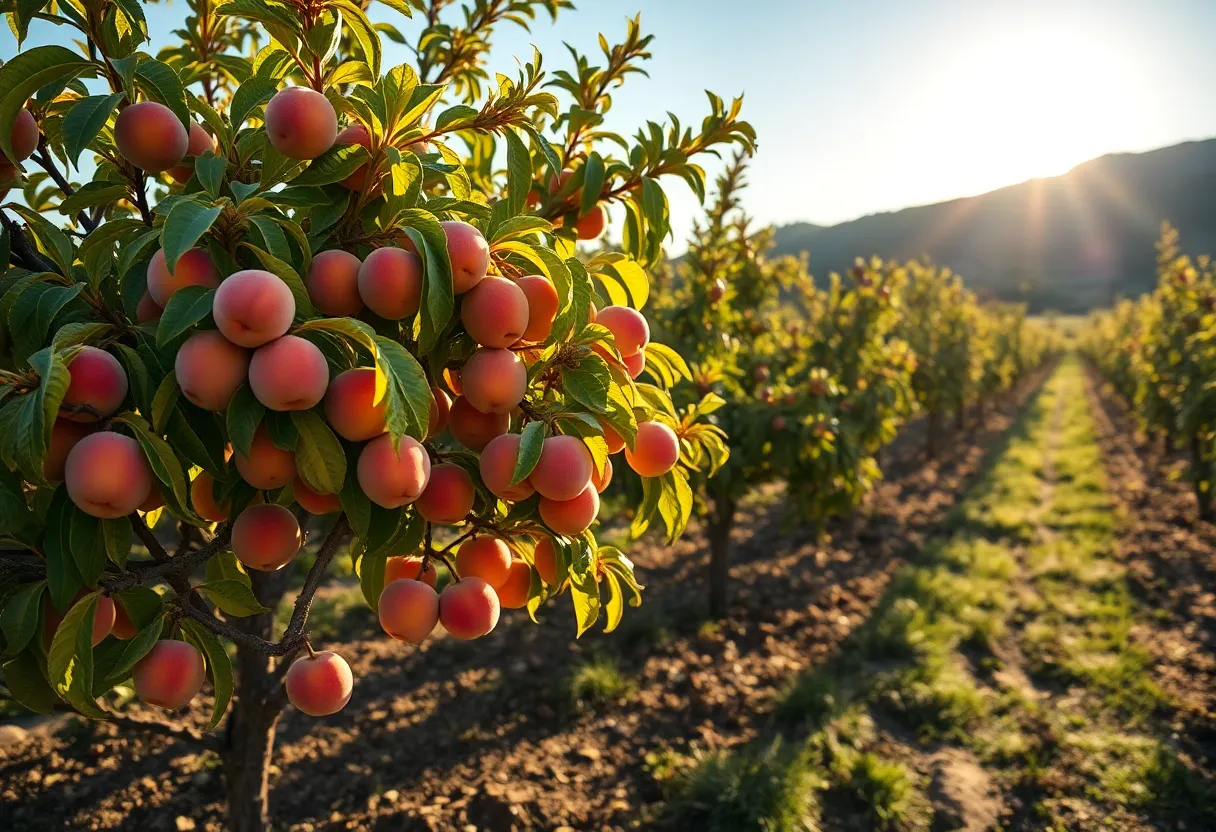News Summary
California and South Carolina are experiencing significant declines in peach harvests due to climate change. Farmers face economic challenges as warmer winters disrupt essential sleep cycles for peach trees, leading to reduced quality and quantity of fruit. With 30% fewer peaches reported from California’s Masumoto Family Farm and a 70% crop loss in South Carolina, growers are adapting through protective measures. This situation emphasizes the urgent need to address the economic and agricultural significance of peach farming in these regions.
California and South Carolina are grappling with significant declines in peach harvests due to the pervasive impacts of climate change. In California’s Central Valley, the Masumoto Family Farm has reported a 30% decrease in this year’s peach harvest, primarily attributed to warmer winters disrupting the trees’ essential sleep cycles, which regulate nutrient intake.
This reduction poses a serious economic challenge for growers like Mas Masumoto, who depend on the 12-week harvest period to sustain their entire income. The changing climate threatens the very foundation of their livelihoods. Particularly, trees require a certain number of hours below 45 degrees to maintain adequate nutrient levels, a process that has been severely disrupted this year due to inconsistent cold weather and unseasonably warm days during the winter.
Several farmers have registered complete crop losses owing to these changes, leading to overarching concerns about the viability of peach farming. Agricultural experts have observed that trees struggle to store carbohydrates in their roots amidst the increasing temperature fluctuations, which has created a cascading effect on fruit quality and quantity. Consequently, consumers are facing rising prices at the store; for instance, yellow peaches have surged 23 cents per pound in price, while white peaches are up by 17 cents.
Despite these challenges, the Masumoto family has managed to maintain production levels by utilizing their older groves and traditional furrow irrigation methods that promote soil health, as opposed to modern techniques focused solely on the individual plant. They continue to pack and ship approximately 10,000 pieces of fruit daily to meet market demand.
South Carolina peach growers, too, are facing adversity, with a late freeze wiping out approximately 70% of the harvest. This devastating loss is echoed in neighboring Georgia, where peach farmers have managed to salvage only 5% of their crop due to similar adverse weather conditions. Peach farming is inherently labor-intensive and vulnerable to unpredictable weather, rendering it a risky venture compared to other agricultural pursuits.
In response to these ongoing challenges, many farmers have begun to adopt diverse strategies aimed at mitigating losses. These include securing crop insurance, along with investing in protective measures such as wind machines and controlled burning of straw to safeguard crops against extreme weather events.
The warmer winters have led to earlier blooming in peaches, which further complicates the timing of the harvest. Nevertheless, agricultural experts remain cautiously optimistic about the future of peach production due to advancements in developing newer peach varieties that require fewer chill hours.
Historically, Georgia was the top producer of peaches until South Carolina surpassed it in the volume of peaches harvested. Additionally, there is growing concern among experts regarding a reemerging disease known as phony peach disease (PPD), which poses threats to both fruit quality and yield.
The economic impact of peach farming is tremendous, with around 15,500 acres dedicated to peach cultivation in South Carolina alone, generating over $98 million for the state’s economy. This highlights not only the agricultural but also the cultural significance of peach farming in the region, underscoring the urgent need for ongoing support and understanding of the challenges faced by peach farmers.
In summary, climate change is reshaping the future of peach production in California and South Carolina, as farmers struggle to adapt to warmer winters and erratic weather patterns. The observed economic ramifications further accentuate the importance of agriculture in these states, making it crucial to address the pressing issues that threaten this iconic fruit industry.
Deeper Dive: News & Info About This Topic
- CBS News
- The Guardian
- The New York Times
- ScienceDirect
- Fox Weather
- Wikipedia: Peach
- Google Search: Peach Harvest Climate Change
- Google Scholar: Peach Production Climate Change
- Encyclopedia Britannica: Peach Farming
- Google News: Peach Harvest 2024

Author: STAFF HERE HOLLYWOOD
The Hollywood Staff Writer represents the experienced team at HEREHollywood.com, your go-to source for actionable local news and information in Hollywood, Los Angeles County, and beyond. Specializing in "news you can use," we cover essential topics like product reviews for personal and business needs, local business directories, politics, real estate trends, neighborhood insights, and state news affecting the area—with deep expertise drawn from years of dedicated reporting and strong community input, including local press releases and business updates. We deliver top reporting on high-value events such as the Hollywood Bowl summer concerts, the Hollywood Christmas Parade, film premieres at TCL Chinese Theatre, and festivals at the Magic Castle. Our coverage extends to key organizations like the Hollywood Chamber of Commerce and Visit Hollywood, plus leading businesses in entertainment, dining, and tourism that define the local economy. As part of the broader HERE network, including HERELosAngeles.com, HEREBeverlyHills.com, HEREAnaheim.com, and HEREHuntingtonBeach.com, we provide comprehensive, credible insights into Southern California's dynamic landscape.



